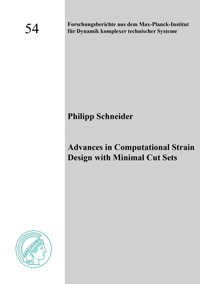
Shop : Details
Shop
Details
45,80 €ISBN 978-3-8440-8411-5Softcover144 pages22 figures212 g21 x 14,8 cmEnglishThesis
January 2022
Philipp Schneider
Advances in Computational Strain Design with Minimal Cut Sets
Metabolic engineering aims to manipulate metabolic networks for different purposes, ranging from the effective bioproduction of value-added chemicals with microorganisms to medical applications. The minimal cut set (MCS) method presents a powerful computational tool for the design of genome-scale metabolic networks. By the means of mixed integer linear programming (MILP), the MCS method identifies a minimal set of genetic intervention targets that reshapes a wild type metabolism according to a template of undesired and desired metabolic functions. This work presents theoretical and algorithmic advances for different stages of the MCS workflow. Many existing strain design approaches aim to enforce growth-coupled production, using different notions of the growth-coupling principle. A systematization of the existing notions into four different coupling degrees serves as a starting point for employing the MCS algorithm for growth-coupled strain design. The formalization of complex strain design tasks as MCS problems is often limited by the feature set of the traditional MCS algorithm. The specification of multiple desired and undesired flux spaces, the use of "optimality constraints", the declaration of reaction or gene addition candidates and the application of individual intervention costs generalize the MCS approach and allow the tailoring of the metabolic flux space with unprecedented precision. An MCS computation yields up to some thousand strain design candidates that can be further characterized with different criteria using computational methods. A subsequent ranking of strain designs helps to select the most promising candidate for experimental implementation.
Keywords: metabolic engineering; constraint-based modelling; Computational Strain Design
Forschungsberichte aus dem Max-Planck-Institut für Dynamik komplexer technischer Systeme
Edited by Prof. Dr. Peter Benner, Prof. Dr.-Ing. Udo Reichl, Prof. Dr.-Ing. Andreas Seidel-Morgenstern and Prof. Dr.-Ing. Kai Sundmacher, Magdeburg
Volume 54
Available online documents for this title
DOI 10.2370/9783844084115
You need Adobe Reader, to view these files. Here you will find a little help and information for downloading the PDF files.
Please note that the online documents cannot be printed or edited.
Please also see further information at: Help and Information.
Please also see further information at: Help and Information.
| Document |  | Document | ||
| Type |  | |||
| Costs |  | 34,35 € | ||
| Action |  | Purchase in obligation and download the file | ||
| Document |  | Table of contents | ||
| Type |  | |||
| Costs |  | free | ||
| Action |  | Download the file | ||
| Document |  | Appendix | ||
| Type |  | ZIP | ||
| Costs |  | free | ||
| Action |  | Download the file | ||
User settings for registered online customers (online documents)
You can change your address details here and access documents you have already ordered.
User
Not logged in
Export of bibliographic data
Shaker Verlag GmbH
Am Langen Graben 15a
52353 Düren
Germany
Am Langen Graben 15a
52353 Düren
Germany
Mon. - Thurs. 8:00 a.m. to 4:00 p.m.
Fri. 8:00 a.m. to 3:00 p.m.
Fri. 8:00 a.m. to 3:00 p.m.
Contact us. We will be happy to help you.



